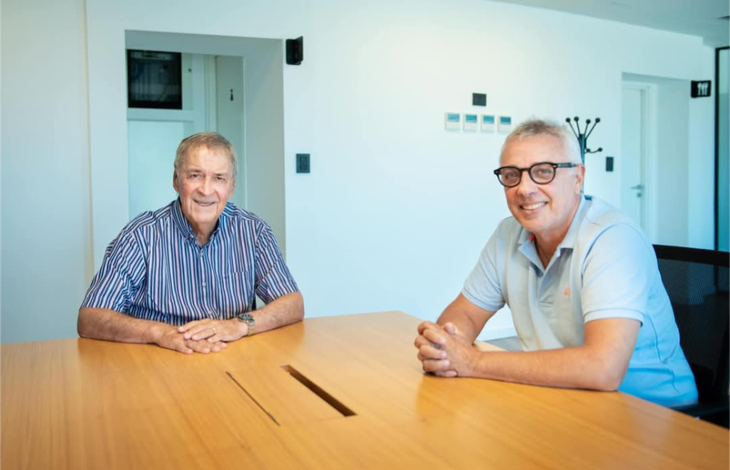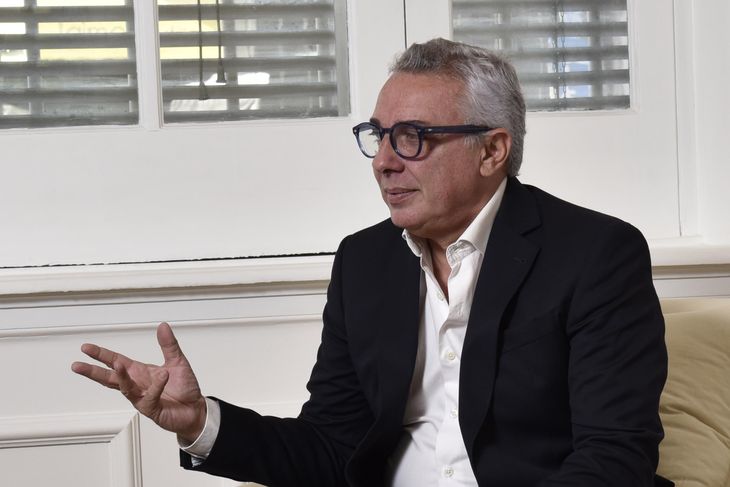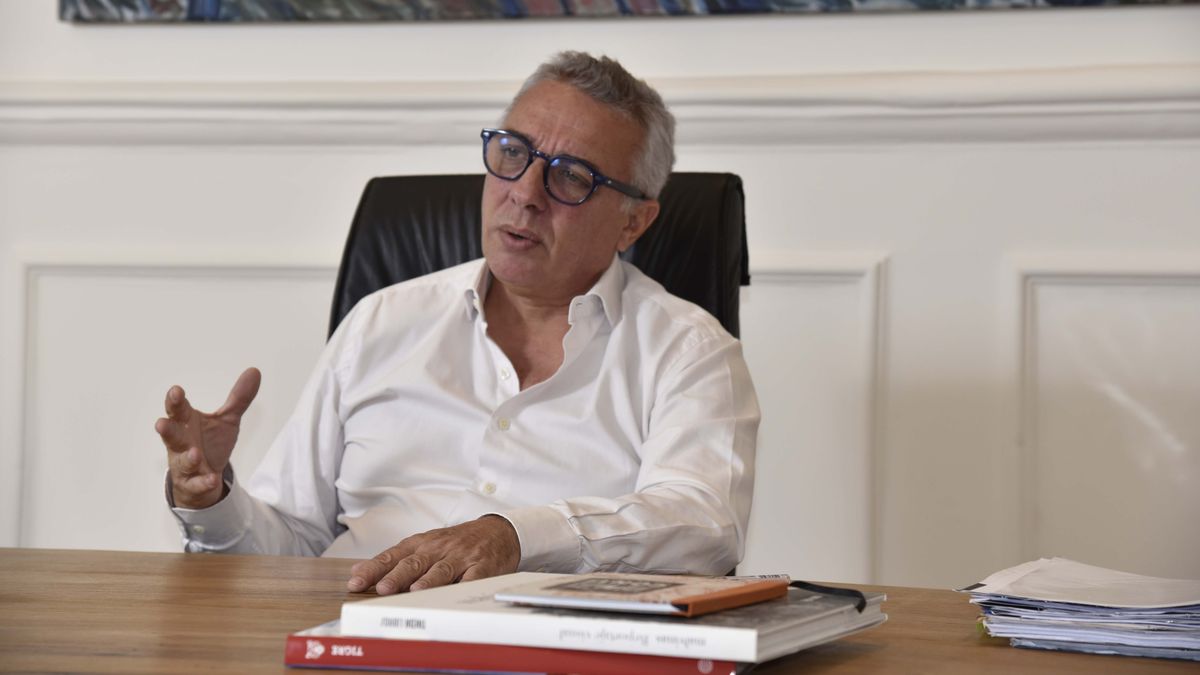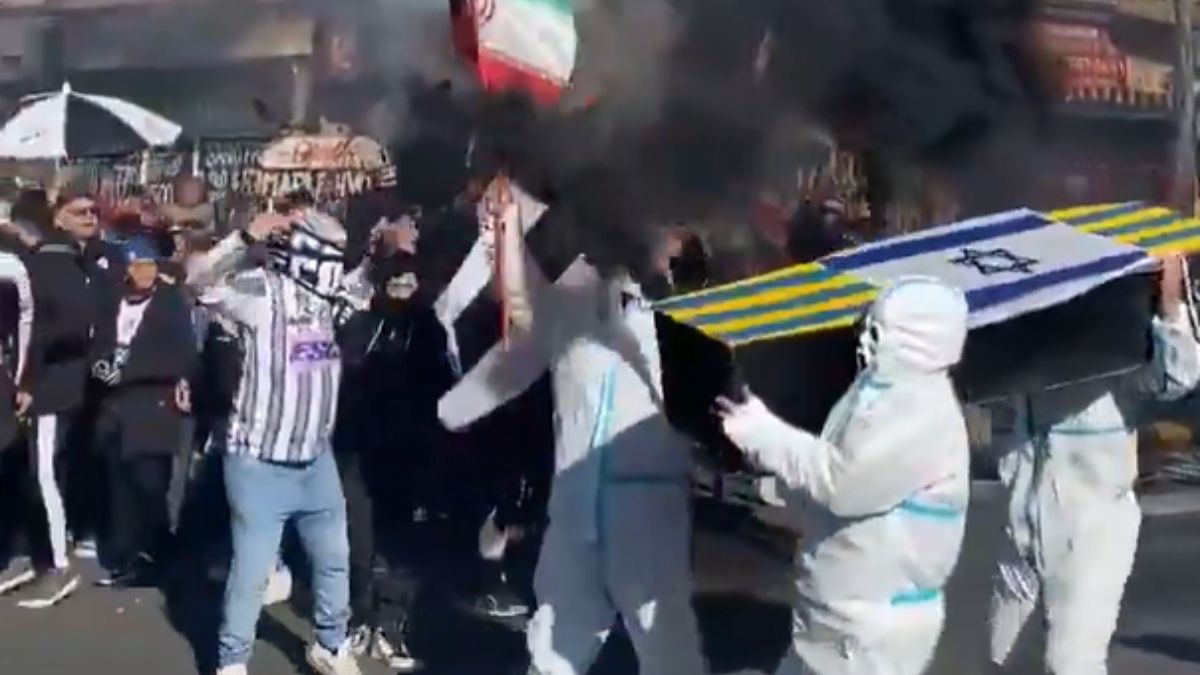Journalist: How do you evaluate the policies deployed by the National Government?
Julio Zamora: We are seeing the impact of these policies on our communities, with different union conflicts product of dismissals that occur in some SMEs and social situations. The neighbors go to the municipality in search of Food helpof employment and with concerns by having to pay services, taxes and fees with increases; A whole economic adjustment that impacts each of the households of tiger. I see one situation of great concern in families and merchants. However, it is also fair to say, many people yet, despite living these situations, somehow have a critical support for the government.
Julio Zamora, mayor of Tigre.jpg
Julio Zamora spoke with scope in his office.
Q: How do you explain that support indicated by surveys to the President?
JZ: It can be for a matter of communication. There is a lot of emotion in the communication of social networks, which is transmitted to the decision and will of the neighbors. There is a process that It will culminate in a disappointment by the neighbors who believe today in the course of this government. They put the feeling that a desert must be crossed to reach a goal. And that goal is getting further further And the people who suffer to this government will end up taking note that it will be frustration.
Q: You are doing a national tour. Are you thinking of an alternative Peronist armed?
JZ: I was this week in Córdoba, signing with the mayor of Villa María, Eduardo Accastello, a mutual cooperation agreement on security and tourism I also went to greet Juan Schiaretti, who was in the municipality a few months ago giving a talk about Government efforts. We share concerns we have regarding the horizon of Argentinaregarding politics, how to elaborate a tool that can overcome different frustrations that we had in politics from Peronism. Córdoba also has a Peronism with special characteristics, the result of disagreements with the National Government of the time, of Cristina, which sustains so far. The experience we had in the last four years of Peronist government summons us to transfer some imaginary borders that we already had to be able to rethink together with other political leaders, not only of Peronism, but of other spaces, the elaboration of a common space that is still incipient. They are conversations, dialogues that allow us to start gliming that. There is nothing concrete, but one sees in the characteristics of Schiaretti a very solid person, with an important government experience, with values that we share, product of a common origin, and we have no pruritus in being able to sit down to dialogue. It is important at this stage of Argentina of so much confrontation.
Julio Zamora and Juan Schiaretti.png

Zamora was received in Córdoba by Juan Schiaretti.
Q: Do you understand that the departure is above and that there is space for a third option outside Peronism, from Lla and Pro?
JZ: I’m always going to feel Peronist. The theme is: What Peronism we talk about and what is Peronism today. That is the great debate that occurs in our space. We come from a stage and a defeat that was very moving for all Peronism, for which he militates, for which he had a hope of change in 2019, which was frustrated. You have to rethink and resignify the ideas that were born to Peronismhow to ride in the mount of the time, how to think about politics with those original values, but appropriate to an Argentine that needs to overcome a stage and go another path.
Q: How do you analyze the situation that La Cámpora and Governor Axel Kicillof are going through?
JZ: It is a confrontation of the same space of Peronism, which has us as spectators because we do not participate in it. There must be a place for dialogue and to think beyond the traditional structure of Peronism how we join wills with other political spaces. That is the way. That confrontation makes Peronism very bad.
Q: Who can be part of this space? It is speculated with the names of leaders from various spaces such as Horacio Rodríguez Larreta, Florencio Randazzo, Miguel Pichetto, Facundo Manes, Facundo Moyano, Martín Lousteau, Margarita Stolbizer, Ricardo López Murphy.
JZ: The level of confrontation that is transmitted from the national sphere and some answers that are also very violent, merit that Let’s put aside party identities that are exhausted today and that we can think among all, without any exclusions, the elaboration of a common space With these figures and with all the figures that have the will to build an Argentina without confrontations. It can’t be a mouth-river. We must think about work as an element of balance and growth of Argentina, think of a stable economy, in a fiscal balance, in having the accounts, in a normal Argentina, in which we can travel all in that space. I’m not going to give proper names because I can’t do it. With Manes and Larreta we share many values, but that does not mean that no new space is defined. They are dialogues that can have their fruits as long as we all understand that we should not put proper names to build a much more normal Argentina in the future.
Q: And around what figure do you estimate that a new leadership could make up?
JZ: Schiaretti is a person who can contribute a lot to Argentina. His experience as governor of Córdoba, as a national official, has always been contribution. In Córdoba there is a very virtuous government policy. But I can’t give proper names. First, we have to elaborate a work agenda, a program, and from there see who is the one that best represents those dreams of an Argentina that provides an umbrella to all, without excluded and with employment.
Q: Should Peronism in general do a self -criticism?
JZ: Yes. Peronism needs criticism regarding its leadership selection methodology. The anti -democratic mechanisms led us to a crossroads that we could overcome it well, but it could have gone badly. And also of essence, what is Peronism. Today that discussion is not taking place, there is no place to debate, there is no clear leadership that can conduct that and we are in a process of reformulation of Peronism and parties policy as well.
Q: Do you think there is no clear leadership by Cristina Fernández de Kirchner?
JZ: I think he is under discussion. I do not want to miss the respect to who was twice president of the Nation, but it was stated that he came to order Peronism and Then we only saw unemploymentboth in the Chamber of Deputies and in the situation with the Government of the Province. They are all issues that do not have a clear conduction.
Q: Then do they work on the construction of a space that seeks to offer an alternative outside the universe of Peronism K?
JZ: I don’t have that question in my mind. I I’m not against Peronism K. I am part of Peronism, I am not outside, and I think We must resignify it. Governor Kicillof also met with Maximiliano Pullaro and Nacho Torres. Peronism must transfer its borders. We must think an alternative political space to overcome this stage that is very suffering for Argentines.
Q: Can that then include Kicillof, Cristina, Máximo?
JZ: Yes, as long as there is a change of posture, speech, language and approach to reality by the sectors that are today in an internal fight that we consider that it does not correspond. We can dialogue, but at this time the fight is so strong, we run from that situation. We do not build against anyone. I want that to be clear.
Q: Can you, in this panorama, reach that unit?
JZ: Yes, of course. Unity always prevails over all things. But in 2019 it said “unit until it hurts.” Well, that proved that it is important, that it is necessary, but that it is not enough, because we did not have a political program agreed among all the forces that integrated the front and had a very traumatic situation. So, First political agenda and then, hunter all possible forces.
The Province of Buenos Aires
Q: How do you analyze the security situation in the province?
JZ: We have problems in the province in security. There are issues that correspond to the responsibility of the governor, but there is also responsibility of the National Government. Let’s not forget that This year the province did not receive the citizen security fund and that there is a direct responsibility of the national government in crimes in drugs. The situation merits not that we are pulling stones every day, as is being done verbally, but that we are sentenced at a table: mayors, provincial government and national government, seeing how we solve the problems of our community. The neighbors come to me to see for a problem, for some crime in the place, and we have to answer. I cannot say “the fault is of the governor” or “the fault is of the president”, we have to solve the issues that are and we have done a lot in Tigre, but it is not enough. The social situation causes a lot. And that worries us because, the truth, that the community of Tigre makes a very great effort in security, but we continue to have problems.
Julio Zamora, mayor of Tigre.jpg

Q: The National Government denounces that the municipalities are compulsive collectors and that they give bad services. Do the mayors have margin to repeal municipal rates?
JZ: Let’s see what it means in concrete terms what the municipality charges on taxes. Of those $ 100 that you pay with direct and indirect taxes, for example, when you buy a product, the municipality raises only 3%. With that 3% of the total tax dough paid by taxpayers, we provide security, health, sports, culture, social assistance for people who are unemployed as a result of national economic policies. That attack has no foundation. Us We give account every year of what we do with our municipal rates. The citizen can see for accountability, on the street and when he crosses us, how we use those resources we perceive from the neighbors, how the community returns to the rate paid by the neighbor.
Q: What do you think of indefinite reelections?
JZ: Indefinite re -election is an issue that is not on a public agenda today. We did not do any action to ask for the re -election of mayors. We obviously consider that There is a constitutional obstacle. When Governor María Eugenia Vidal promoted this article, she was already crossed out of unconstitutionality, because the Constitution of the Province of Buenos Aires does not establish the non -re -election of the mayors and does establish the non -re -election of the governor. What the constitutionalists say is that, if the constituent of the province of Buenos Aires would have wanted the non -re -election of the mayors, it would have to be in the constitutional command. However, it is not an agenda issue for us.
Q: Do you think the Buenos Aires elections must be unfolded?
JZ: I think it is a fact that will be imposed because it will be very complicated from the logistic point of view to make a provincial choice with a sheet with a national choice with a single ballot. That will confuse the electorate a lot. There is no clear procedure, everything is done within the election year, it is all very confusing, really. Disdoblation may contributes a little more clarity to the choice. The unfolding can put the issues of the province that concern us: citizen security, health and education.
Source: Ambito
I am a 24-year-old writer and journalist who has been working in the news industry for the past two years. I write primarily about market news, so if you’re looking for insights into what’s going on in the stock market or economic indicators, you’ve come to the right place. I also dabble in writing articles on lifestyle trends and pop culture news.




